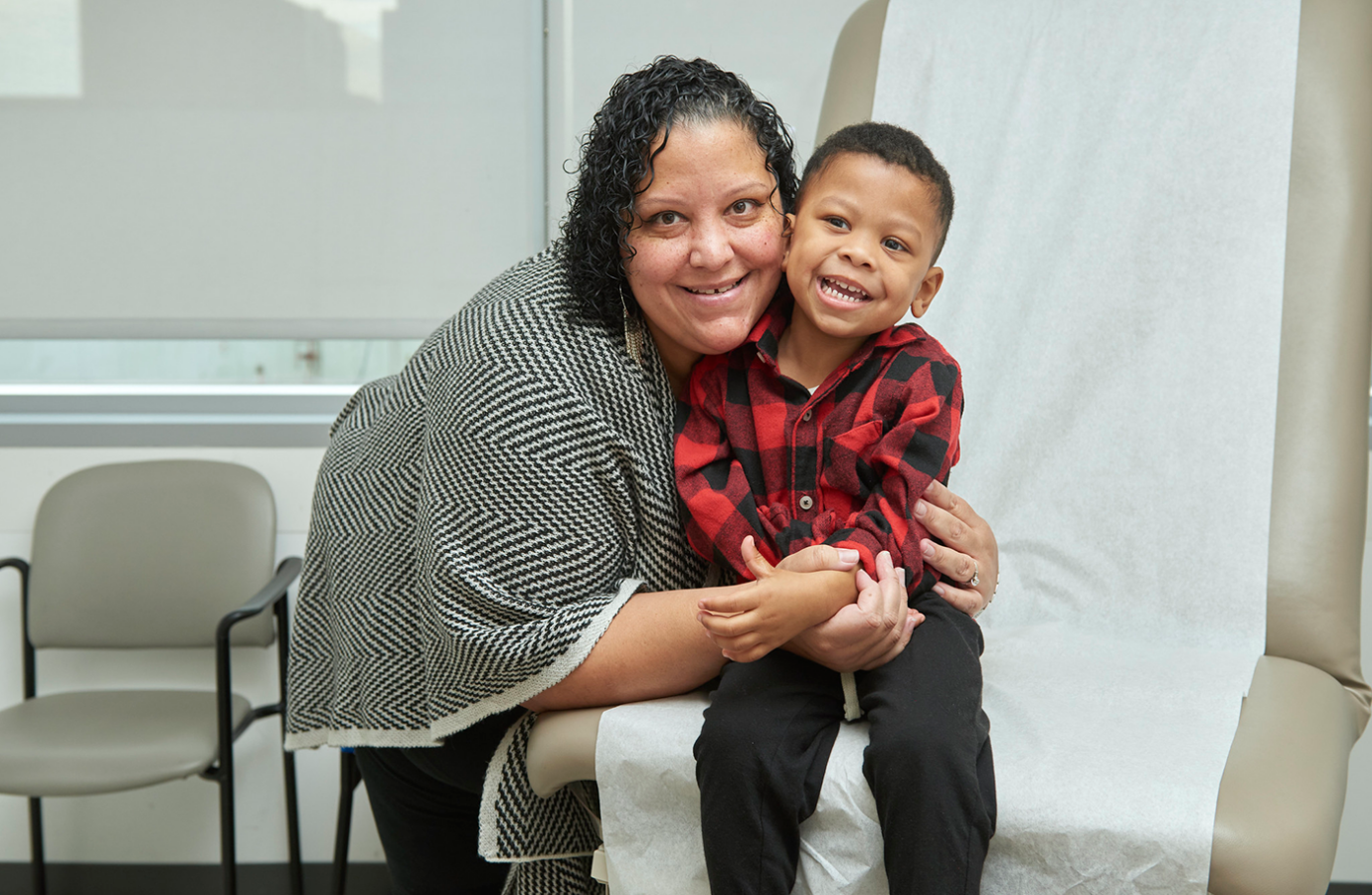At the end of Elijah Miller’s six-month checkup at Penn Family Care in late 2020, Mario DeMarco, MD, a physician there, turned to the infant’s mother and asked how she was handling life as a first-time mom. That’s when the floodgates opened.
Nicole Miller, then 35, of Delaware County, had given birth to Elijah at the Hospital of the University of Pennsylvania between two events that defined 2020: the March COVID-19 lockdown and the May murder of George Floyd, a Black man in Minneapolis, by police. But it wasn’t until Miller returned to work a few months after Elijah’s birth that her mental health began to suffer. Miller, who identifies as African American and Italian, found her ongoing anxiety heightened not only by the typical concerns of new motherhood, like managing a breastmilk pumping schedule, but also by a deadly pandemic and waves of protests against the police brutality of Black citizens. By the time of that late fall visit with DeMarco, an associate professor of Clinical Family Medicine and Community Health and director of Family Medicine Obstetrics at Penn Medicine, Miller’s knees were aching under the 50 pounds she had recently gained from stress-induced binge eating.
With DeMarco’s gentle questioning, Miller realized she was struggling with postpartum depression. “If nobody would ask me about [my feelings], I don’t think I would share them with anybody,” she said. “I would try to figure them out on my own. And I don’t think I would figure them out in a healthy way.”
Like so many new mothers, Miller never missed a checkup for her baby—at least five pediatrician appointments in the first six months of life. When time and resources are limited, as they often are for new parents, most mothers put their children’s health needs ahead of their own.
Data from more than 170,000 well-child visits at 35 practices across 10 states showed that, in the first two years of a baby’s life, the birth mother was present for 94 percent of those appointments.
“It’s not that women don’t engage with care,” DeMarco said. “It’s that they don’t engage with care for themselves.”
Care for Mothers Past their Pregnancy to Improve Health Equity
The postpartum phase represents a major shift in a new parent’s focus on health care—from their own care to their child’s. For teams across Penn Medicine, it is important to continue supporting the mother’s health in the postpartum period, in particular in the effort to eliminate racial disparities in maternal health outcomes. As Aasta Mehta, MD, MPH, who is both a Philadelphia public health official and an obstetrician-gynecologist at Pennsylvania Hospital, explained the rationale, “When people are pregnant, they’re meeting you halfway. You can’t re-create that motivation any other time in people’s lives. Let’s regain their trust in that time period, so they continue to stay engaged. That impacts not just their health, but their family’s health.”
In 2016, Penn Family Care implemented a unique model known as “interconception care”: its doctors provide health care for mothers during each well-child pediatric visit from 0 to 24 months. Mothers who are present at Penn Family Care well-child visits in the first two years are screened for tobacco use, depression, contraceptive needs, and multivitamin use. Sometimes, the screenings reveal a mom in crisis. “At that point, it is no longer a well-child visit,” DeMarco said. “It is a mom visit, because that’s what that family needs. They don’t need to talk about which Stage One baby foods to eat. They need Mom to get help.”
When Miller shared her struggles, DeMarco responded quickly. He ensured Miller was taking her anti-anxiety medication, emphasized the importance of a visit with her primary care provider, and connected her with a counselor. “Even though Elijah was his patient, he was making sure that my mental health was good,” she said. “If my mental health wasn’t good, how can I be a mom to Elijah?”
All told, DeMarco screened Miller at Elijah’s checkups about 10 times during her first two years postpartum. New mothers without major medical problems are likely to only have a few routine doctor visits during that same period. Some, DeMarco said, receive no care from the moment they are discharged from the hospital after delivery until they become pregnant again.
But receiving health care between pregnancies can help reduce future complications. In 2020, DeMarco was lead author on a study that found that counseling mothers on multivitamin use at their children’s pediatric appointments increased the likelihood the women would take multivitamins. “We can use primary care as an opportunity to help somebody have a healthy subsequent pregnancy,” he said, “or prevent that pregnancy if they’re not looking to become pregnant again.”



A Lifetime of Good Health After Pregnancy
Helping to keep mothers healthy in between pregnancies and while raising their families is an integral part of a unified effort from across Penn Medicine to address racial disparities in the health of pregnant people and new mothers. The system-wide approach, endorsed and supported as a system goal by executive leaders, has garnered participation from any and all departments that could potentially make an impact for these patients, and is also geared toward making an impact locally and nationally to help more patients in more places.
The teams have emphasized standardizing patient care during key moments—such as a standardized care protocol for postpartum hemorrhage that helps to save patients, including 25-year-old Talicia Williams, from life-threatening emergencies in the hours after birth. And they have also incorporated efforts to reduce racial bias, to engage communities, and to use technology to provide remote support to parents through their first weeks at home with a new baby and intervene early in case of complications. With efforts like that of Penn Family Care, the connection continues to help families get off to the right start in the months that follow—the bridge to sustaining a healthy family for life.

Nicole Miller has found her footing as a mother. Last summer, she took 3-year-old Elijah to the beach for the first time (he prefers the pool) and by the fall she was preparing his Buzz Lightyear costume for a local Halloween celebration. “Me and Elijah, we try to do everything together,” Miller said. “We’re just living life through a 3-year-old’s eyes.”
And those normal travails of family life—the joys and the typical tantrums and tensions between mother and child—are exactly what all parents of every racial and ethnic group should get to focus on. It’s the motivation behind Penn Medicine’s efforts to shepherd patients safely from pregnancy and childbirth to the early postpartum period and beyond: to give every new parent a chance to grow and thrive as part of a healthy family and community.









